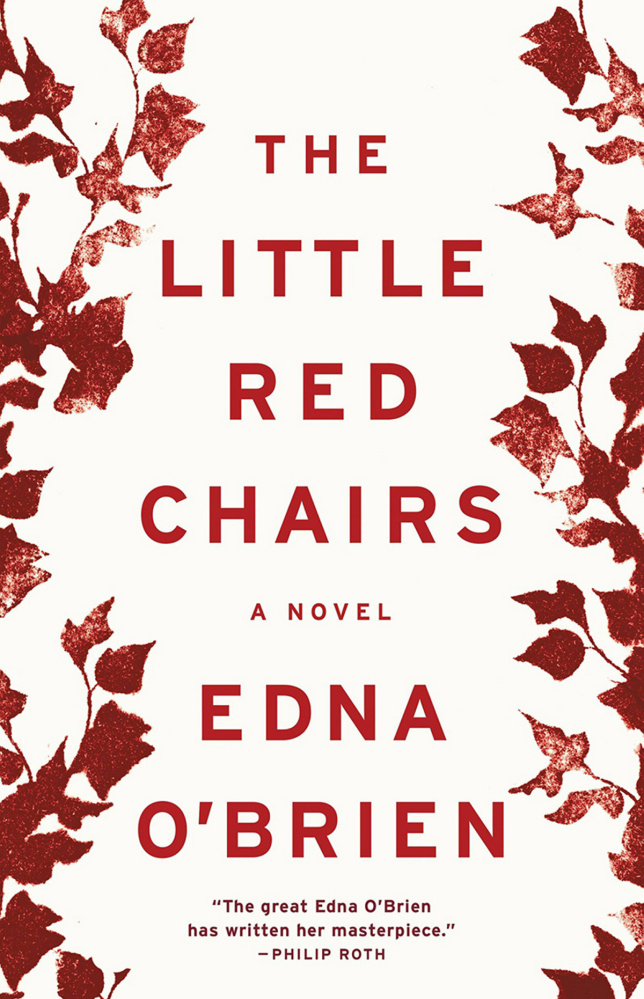Edna O’Brien’s new novel opens in familiar territory for this author: a small village in western Ireland, a “freezing backwater that passes for a town and is named Cloonoila.” O’Brien grew up in County Clare in the 1940s and ’50s, and her first novel, “The Country Girls” – a sensation after being banned in Ireland in 1960 – followed its two heroines through a repressive, isolating village upbringing.
But “The Little Red Chairs,” O’Brien’s 23rd work of fiction, is set in the present day, and into this traditional setting she has introduced an exotic outsider, one described by the barkeep, when he turns up at the local pub, as looking “like a Holy man with a white beard and white hair, in a long black coat.” His name is Dr. Vlad Dragan, he claims to be from Montenegro and he will establish a clinic specializing in “Holistic Healing in Eastern and Western Disciplines.”
The villagers are fascinated by Vlad – at once skeptical and entranced – and none more so than the novel’s protagonist, Fidelma, a beautiful dark-haired shopkeeper in a childless and vaguely unhappy marriage to an older man. Soon Fidelma has begun an affair with the mysterious Vlad, hoping to conceive a baby, and imagining “she had broken through to the real him, the poet, the man of feeling, that she always knew to be there.”
Fidelma and the village will learn that they don’t know “Dr. Vlad” in the least. On an outing for a picnic and poetry reading, their hired bus is pulled over and Vlad taken into custody by police. He is, it turns out, the man called the “Beast of Bosnia,” and will be taken to The Hague and tried for war crimes committed during the Bosnian war of the 1990s. (The book’s title, explained only in a short note at the beginning, refers to the red chairs installed in Sarajevo to commemorate the 11,541 people – and particularly the children – killed in the siege of Sarajevo.) I happened to be reading “The Little Red Chairs” in the week when Radovan Karadžic was convicted of crimes against humanity by a United Nations Tribunal; it was impossible not to see the inspiration for O’Brien’s novel and the dark moral dilemmas – and outright violence – this terrible figure ushers into to her “backwater” Irish town. The aftermath, for Fidelma, is shattering.
The novel’s first half unfolds this tragedy through many points of view, including Fidelma’s, her husband’s, various villagers’, and even that of the foreign workers – “Burmese, Italian, Spanish, Czech, Slovakian, Polish” – who have found themselves in western Ireland for work. The second half follows Fidelma as she drifts through London, essentially exiled from her marriage and from Cloonoila. In a remarkable series of vignettes, Fidelma finds night work as a maid in an office building, room and board with an African immigrant and her daughter, a last confrontation with Vlad in The Hague and finally a kind of redemption at a center for refugees. We hear many of the refugee stories – which, in a lesser author’s hands, might have felt like frustrating digressions. But O’Brien weaves them into her larger theme, the forces of war and misery that monsters such as Vlad unleash – and how they ripple out into the world, touching even the most innocent of us.
“The Little Red Chairs” is a capacious novel full of exquisitely rendered miniatures – the frightened taxi driver who has been hired by the thugs who threaten Fidelma, the garrulous man from Mozambique who hires cleaners at the office building, the eccentric neighbor girl whom Fidelma befriends in London. O’Brien has long been recognized as a gifted short story writer – a collection of her best tales, “The Love Object,” was published to acclaim last year – and here she employs her gift for closely observed moments in the service of a novel that is deeply intimate but global in its vision.
Send questions/comments to the editors.



Success. Please wait for the page to reload. If the page does not reload within 5 seconds, please refresh the page.
Enter your email and password to access comments.
Hi, to comment on stories you must . This profile is in addition to your subscription and website login.
Already have a commenting profile? .
Invalid username/password.
Please check your email to confirm and complete your registration.
Only subscribers are eligible to post comments. Please subscribe or login first for digital access. Here’s why.
Use the form below to reset your password. When you've submitted your account email, we will send an email with a reset code.